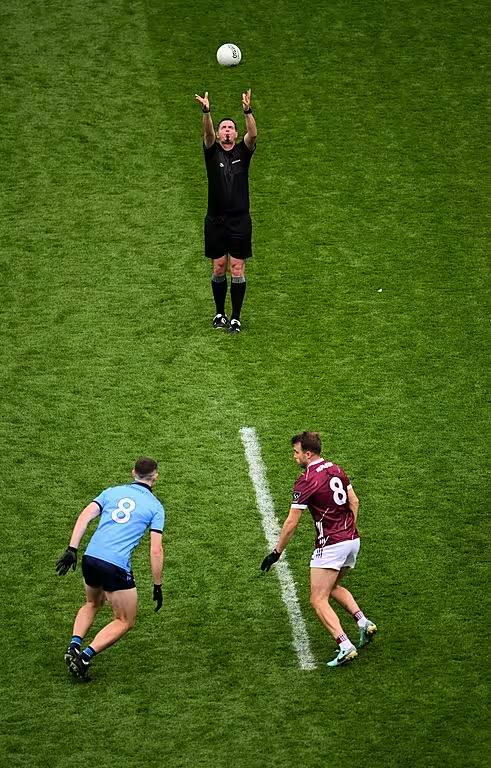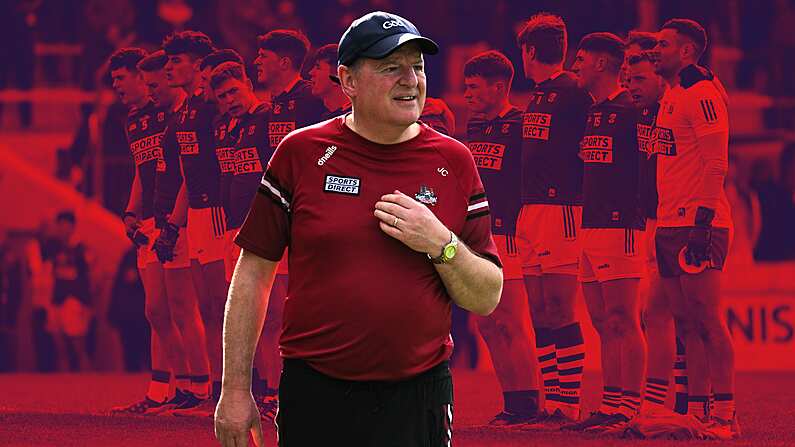On Saturday, the GAA took a bold leap forward, as the seven core proposals of Gaelic football's Review Committee were voted in for 2025 at Special Congress.
The Football Review Committee, led by Jim Gavin, have worked extensively over the past year, engaging with key stakeholders and analysing scores of data to develop the changes they deem necessary to push Gaelic football in a bold new direction.
Ultimately, the committee put forward seven key proposals which were put to the test across 2024 in seven "sandbox" games behind closed doors, before being trialled publicly at October's televised Railway Cup games in Croke Park.
Largely seen as an encouraging trial, the Railway Cup games saw minor tweaks to some of the rules. Alongside some less revolutionary changes, the seven core proposals were put before Special Congress at Croke Park on Saturday morning.
There was little opposition to any of the seven major motions, with all passing with over 80% of the vote at GAA HQ. All rule changes will also apply at both club and inter-county level for competitions beginning in 2025.
We've broken down the seven major rule changes that have been voted in for 2025 by GAA's Special Congress.
READ HERE: O'Callaghan Perplexed By Tommy Bowe's Wild David Clifford Rugby Switch Claim
READ HERE: UCD Freshers Winner Compares Himself To Dublin Greats In Sensational Post-Match Interview
GAA: The seven rule changes proposed by the Football Review Committee
1v1 throw-ins

29 June 2024; Brian Fenton of Dublin and Paul Conroy of Galway get ready as referee Sean Hurson throws the ball in to start the GAA Football All-Ireland Senior Championship quarter-final match between Dublin and Galway at Croke Park in Dublin. Photo by Ray McManus/Sportsfile
MOTION 4: The motion proposes that the referee, facing the players, starts the game and re-starts it after half-time, by throwing the ball between one player from each team, in their own defensive sides of the halfway line. A second player from each team shall stand on opposite sidelines at the halfway line. The second players shall swap sidelines for the second-half throw-in. All other players shall be in their respective positions behind the 45m lines.
The first of the seven proposals will see just two players contest the throw-in at the beginning of each half. The FRC have explained that the consistent fouling at 2v2 throw-ins was the motivation for bringing in this rule change. The hope is that the new setup will allow the player gaining possession to break into attack immediately.
The FRC also said that calls for referees to crack down on fouling at throw-ins in 2024 had not been deemed successful, increasing the perceived need for change in this area.
Kick-outs
MOTION 5: This motion proposes a kick-out off the ground from the centre point of the 20m line and shall be kicked forward. If the goalkeeper is not taking the kick-out, the goalkeeper shall stay in the small rectangle. All other players shall be at least 13m from the ball until it is kicked. The player taking a kick-out may kick the ball more than once before any other player touches it, but may not take the ball into the hands. The ball shall travel not less than 13m and outside the 40m arc before being played by another player of the defending team. Players may remain inside the 20m line. Players may not impede or interfere with the goalkeeper, or another opposition player, taking the kick-out. Players may remain inside the 40m arc, but must not be closer than 13m to the ball when it is being kicked.
In a lengthy and detailed report circulated by the FRC at October's Croke Park media briefing, it was argued that the resumption of play is oftentimes delayed by players slowly returning to position outside the 20m line. The hope is that this change will encourage teams to quickly develop attacks, while also creating room for innovation with how the attacking team utilises the space inside the 20m line.
Kick-outs can also only be played once the ball has travelled past the 40m arc, with the hope for this to create more 1v1 contests due to the increased size of the area.
Role of the goalkeeper

30 June 2024; Derry goalkeeper Odhran Lynch kicks a point from play during the GAA Football All-Ireland Senior Championship quarter-final match between Kerry and Derry at Croke Park in Dublin. Photo by Piaras Ó Mídheach/Sportsfile
MOTION 14: This motion proposes that a goalkeeper may only receive the ball from a teammate (a) inside the large rectangle when both the goalkeeper and the teammate passing the ball are inside the large rectangle or (b) when the goalkeeper is in the opposition half of the field.
During a roundtable discussion with Balls.ie in October, Jim Gavin said that this rule had received a mixed reception from the goalkeepers involved in the sandbox games thus far but, if executed correctly, it could be a major blow to the slow, possession-based football which the FRC are seeking to eliminate.
Under the new rules, the goalkeeper can receive the ball from a teammate inside his own half only when both players are inside the large rectangle. He may also receive a pass from a teammate after crossing the halfway line.
The potential to exploit this rule was showcased magnificently by Tyrone's Niall Morgan in the inter-provincial series.
Solo-and-go
FRC: "A player fouled may immediately take a solo and go."
Multiple members of the GAA Football Review Committee said that the "solo-and-go" had been the best received of the seven core principles during the series of sandbox games.
This rule change will remove the condition that players must seek the referee's permission to take a free-kick, with the goal of speeding up the pace of the game. The solo-and-go must be taken in a forward direction, and the player taking it is allowed 4m of advantage - they cannot be challenged within 4m of where the solo-and-go is taken.
Any player on the team fouled can take the solo-and-go, provided the ball is tapped within 4m of where the initial foul took place.
3 players in each half
MOTION 16: This motion proposes that during play, a team must have at least three outfield players on each side of the half-way line. Exceptions will be made where the number of players on a team is reduced below 15, the number of players that team is required to keep on each side of the half-way line is reduced accordingly e.g. if there are 14 players on the team, it must have at least two outfield players on each side of the half-way line.
The goal behind the 3/3 rule is to create more structure to the game and encourage more attacking play twofold. Firstly, the number of defending players in a team's half will be limited to 11, opening more space for attackers, while the three players remaining upfield will create opportunities for quick counter-attacking play.
Enforcement of this rule will differ depending on the scenario in which the offence occurs but, in most scenarios, the penalty will be a free kick to the opposition on the offending team's 20m line.
Advanced mark

24 March 2024; Joe Oguz of Tyrone wins a mark during the Allianz Football League Division 1 match between Dublin and Tyrone at Croke Park in Dublin. Photo by Shauna Clinton/Sportsfile
FRC: "The current advance mark is gone. A new mark is introduced whereby a player may claim a mark if the ball is caught inside the 20m line after it is kick passed outside the 45m line. To reward the risk, the player may continue on until the advantage is no longer accrued, whereby the referee will give a free-kick from the place of the mark."
Though a player can still avail of a mark immediately by raising their arm upright, the goal of the updated advanced mark ruling is to encourage more exciting and ambitious play by affording players the option of an advantage.
An example of David Clifford's mark in the 2022 All-Ireland football final was frequently cited by the FRC as the kind of incident this change seeks to eradicate from the pre-existing advanced mark ruling.
40m arc and scoring
MOTION 20: The motion proposes a point is scored when the ball is played over the crossbar between the posts by either team, inside the 40m arc or inside the 20m line. Two points are scored when the ball is played directly over the crossbar between the posts (whether from a free kick, solo and go, or from general play), having been kicked by a player who has at least one foot on or outside the 40m arc and without the ball having been touched by any other player. The exception is when the ball is played over the crossbar between the posts from a 45, one point is awarded. A goal is equivalent to three points.
The most radical of the rule changes, the 40m arc will change the scoring system in Gaelic football for the first time since 1896.
The FRC hope that this change will encourage teams to try more spectacular long-range shots. The attacking team will be forced to decide whether to take an audacious long-range shot or to play the ball in closer to goal. Meanwhile, the defending 11 will have to choose between vehemently defending their 2-point arc and sacrificing space closer to the goal, or vice versa.
Gavin's Football Review Committee believe this will get GAA supporters "up off their seats."
This rule also originally included the introduction of four points for a goal alongside the 2-point arc. This aspect was ultimately scrapped after October's inter-provincial series.
It's an enormous change of the rule-book, in one of the most exciting GAA rule shake-ups in years. How the 2025 inter-county season will now play out remains to be seen.














